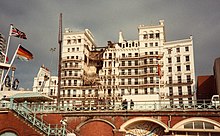Bomb attack on the Grand Hotel in Brighton
On October 12, 1984, the Provisional Irish Republican Army (IRA) carried out a bomb attack on the Grand Hotel in Brighton through its member Patrick Magee . The aim of the attack was to kill Prime Minister Margaret Thatcher and the British Cabinet who were staying at the hotel during the Conservative Party Conference .
attack
Patrick Magee signed in under a false name at the Grand Hotel Brighton on the weekend of September 14-17, 1984, in order to plan the attack. He hid a bomb in his bathroom 24 days before the attack, which he detonated with a time fuse, which he assembled from components of a video recorder. Approximately 20 pounds of blasting gelatin were used , which corresponds to about 9 kg.
The bomb exploded at 2:54 a.m. on October 12 as Thatcher was working in her suite on her speech for the day ahead. Her bathroom was destroyed, but the living room and bedroom were not. As a result, she and her husband, Denis Thatcher, were unharmed and spent the rest of the night at the Sussex Police Headquarters . Before leaving the hotel, she gave the BBC an interview. The conference started at 8:00 a.m. as planned, and Margaret Thatcher visited the injured at Sussex Hospital.
Thatcher's literal coolness in the face of the attack earned her great approval.
Five prominent members of the Conservative Party (CP) were killed in the attack: Eric Taylor (54 years old), chairman of the CP in the north-west of Great Britain; Anthony Berry, 59 years old, CP MP for Enfield, Southgate; Anne Wakeham (45 years old), wife of the group leader of the ruling CP; Jeanne Shattock, 52 years old, wife of the CP of the Western Territory, and Muriel McLean, 54 years old, wife of the chairman of the Scottish Conservatives. 31 people were injured, including Norman Tebbit , then Minister of Labor and Minister of Commerce and Industry.
Reactions
Thatcher was a controversial political figure. At the time of the attack, preparations for the British miners' strike in 1984/1985 were taking place. The musician Morrissey , front man of the band The Smiths , said shortly after the attack that he was just sorry that Thatcher survived it unharmed. David Bret wrote in his book Morrissey: Scandal & Passion that tabloid journalism was full of such remarks. A workers' club in South Yorkshire seriously wanted to raise money to finance a second attack. In 1986 the English punk band the Angelic Upstarts celebrated the attack with their single "Brighton Bomb".
David Hughes, a journalist for the Daily Telegraph, called the attack the end of innocence in Britain.
Patrick Magee
The next day the IRA confessed to this attack. Patrick Magee, 35, who pretended to be Roy Walsh , was sentenced to 35 years in prison in September 1986. He was released after 14 years under the Good Friday Agreement .
In 2000, Magee interviewed The Sunday Business Post . The British government at the time had no interest in ending the unrest in Northern Ireland and decriminalizing the IRA:
As long as the war was kept in that context, they could sustain the years of attrition. But in the early 1980s we succeeded in destroying both strategies. The Irish hunger strike destroyed the notion of criminalization and the Brighton bombing destroyed the notion of containment […] After Brighton, anything was possible and the British for the first time began to look very differently at us; even the IRA itself, I believe, began to fully accept the priority of the campaign in England .
“As long as the war went on in this context, they could continue the war of attrition for years. But in the early 1980s we managed to destroy both strategies. The 1981 Irish hunger strike shattered the thought of criminalization and the Brighton bomb shattered the thought of containment. After Brighton anything was possible and for the first time the British saw us differently; even the IRA itself, I believe, began to accept that the fight in England was a priority ”
Regarding the bomb victims, Magee said: "I deeply regret that anybody had to lose their lives, but at the time did the Tory ruling class expect to remain immune from what their frontline troops were doing to us?" (I deeply regret anyone lost their life, but could the Tory ruling class at the time expect them to remain immune while their frontline soldiers did this to us?)
In the movie
In the feature film Die Eiserne Lady (2011) about Thatcher's life, the assassination is discussed.
Web links
- Reprint of BBC television news report on the morning of the attack
- BBC News photo journal of the attack
- BBC News report on Straw's attempt to prevent the early release of Magee
- Guardian story on the release of Magee in 1999
- To Phoblacht: Interview with Pat Magee regarding the Brighton bombing
- BBC report on Magee being convicted of the bombing
- Looking back on the Brighton Bomb with Video ITV.Local
Individual evidence
- ↑ a b https://www.theguardian.com/fromthearchive/story/0,,1235581,00.html Gareth Parry: Patrick Magee convicted of IRA terrorist attack in The Guardian of June 10, 1986
- ^ Clarke, Liam: IRA mole warned police about Brighton bomb , Sunday Times , December 15, 1996
- ^ Campbell, Margaret Thatcher. The Iron Lady (Jonathan Cape, 2003), p. 432.
- ↑ 1984: Tory Cabinet in Brighton bomb blast on BBC (accessed January 8, 2012).
- ↑ Bret, David. Morrissey: Scandal & Passion . Franz Steiner Verlag, 2004. p. 111
- ↑ Bucklet, Peter. The Rough Guide to Rock . Rough Guides, 2003. p. 31
- ^ "Brighton Bomb was a turning point - Magee" . To Phoblacht , August 31, 2000.
Coordinates: 50 ° 49 ′ 17 ″ N , 0 ° 8 ′ 50 ″ W.
